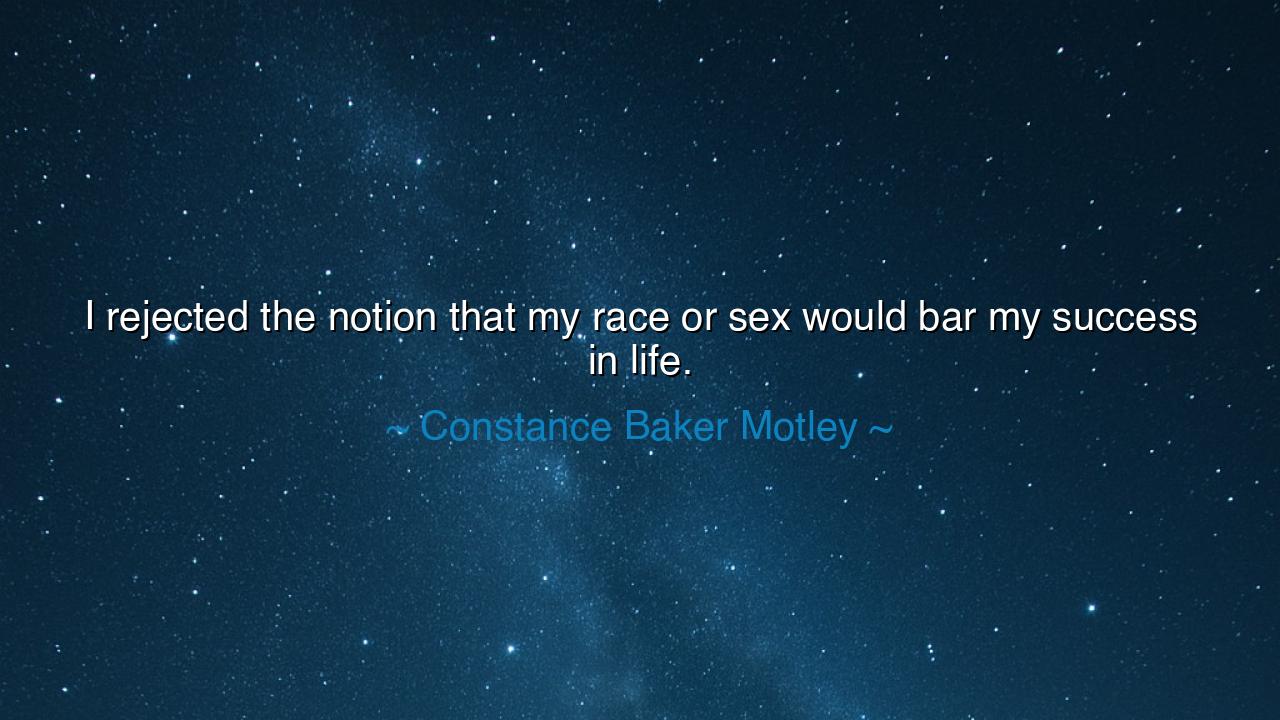
I rejected the notion that my race or sex would bar my success






Hear the bold and unyielding words of Constance Baker Motley, who declared: “I rejected the notion that my race or sex would bar my success in life.” These words are not mere sentiment, but a battle cry forged in the fire of struggle. They speak of a spirit that would not bow to the chains of prejudice, nor surrender to the low expectations of a society that sought to silence her. Motley’s words reveal the strength of one who understood that the world may place barriers before her, but her will, her labor, and her vision could break them down.
The ancients themselves revered such courage. Consider the Spartan mothers, who told their sons to return from war “with your shield, or on it.” Their message was one of defiance against limitation, of refusing to yield. So too did Constance Baker Motley carry this same spirit, refusing to let the labels of race and sex define her destiny. She proclaimed to the world that greatness is not decided by circumstance of birth, but by the fire of one’s determination.
Motley’s life itself is the embodiment of her words. Born to a working-class family, she rose to become the first Black woman appointed to the federal judiciary, and before that, a key figure in the Civil Rights Movement. As an attorney, she worked alongside Thurgood Marshall and argued cases that toppled segregation in schools, housing, and public life. At each stage, voices told her she could not succeed—because she was a woman, because she was Black. And yet, she shattered these boundaries, proving that rejection of imposed limits is the first step toward true success.
Consider also the story of Harriet Tubman, who, though enslaved and oppressed, rejected the notion that bondage would dictate her fate. She not only escaped but returned time and again to free others, becoming a conductor on the Underground Railroad. Tubman’s defiance, like Motley’s, teaches us that the world’s expectations are not destiny. They are walls built by others, and the courageous tear them down with action.
Motley’s words also speak to the deeper truth that oppression thrives not only through laws and institutions, but through the acceptance of those limits by the oppressed themselves. To reject those notions is to strip power from them. The true battle is fought first in the heart, when a man or woman says: “I am not bound by what you tell me I cannot do.” This act of inner rebellion opens the path for outer triumph. Motley shows us that freedom begins with refusal—the refusal to believe that one’s identity is a prison.
The lesson is plain: your success is not determined by what the world says about you, but by what you choose to believe about yourself. If you accept the lies of limitation, you will live in chains. But if you cast them off, you will walk in the path of Motley, Tubman, and countless others who made destiny bow to their courage. The world will resist, yes—but the fire of determination burns brighter than the darkness of oppression.
Practical wisdom follows: when you face barriers, do not ask, “Can I?” but declare, “I will.” Reject the inner voice of doubt, for it is the echo of society’s prejudice. Surround yourself with examples of strength, and remember that every step you take toward your goal weakens the chains meant to bind you. Work with purpose, endure with patience, and know that every victory you achieve is not only for yourself, but for all who come after you.
So let the words of Constance Baker Motley be carried forward: “I rejected the notion that my race or sex would bar my success in life.” They are not merely her story, but a timeless commandment. They remind us that greatness is not gifted, it is seized; that barriers are not walls, but illusions, waiting to be broken by those who dare. Children of tomorrow, hold fast to this truth, and you too shall rise, unbound by the limitations of others, into the freedom of your own destiny.






AAdministratorAdministrator
Welcome, honored guests. Please leave a comment, we will respond soon